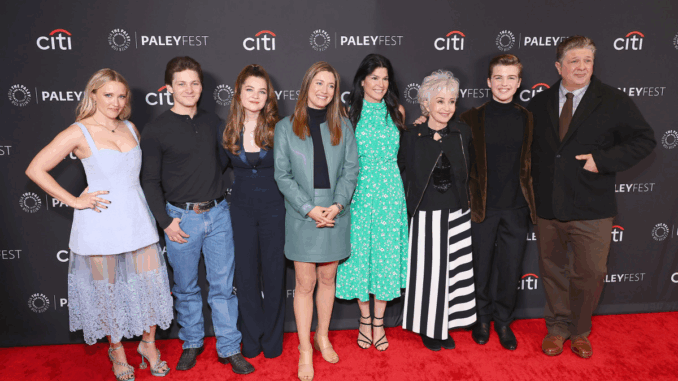
From Criticism to Creation
Critics often accused The Big Bang Theory of relying too heavily on laugh tracks and clichéd sitcom setups. But Chuck Lorre—the show’s legendary co-creator—saw Young Sheldon not as just another spin-off, but as an opportunity to retool and evolve.
Turning a Spinoff into an Origin Story
Lorre and co-creator Steven Molaro were initially resistant to spinning off another show, but the idea started with Jim Parsons. Chuck Lorre trusted Parsons because he reframed the concept:
“Don’t worry, it’s not a spinoff. It’s really an origin story.”gq.com+15looper.com+15looper.com+15glamour.com+3slashfilm.com+3pressparty.com+3
That repositioning made all the difference, allowing the show to feel fresh instead of recycled.
Format Shift: Ditching Multi‑Cam for Single‑Cam
One of the most important decisions? Shifting from the traditional laugh-track, multi-camera format of Big Bang to a single-camera style—more cinematic, nuanced, and intimate.
Why Single-Cam Worked Better
-
No studio audience meant the young cast didn’t have to “play to the crowd” thedailybeast.com
-
It allowed quiet emotional beats, like family dinners or serious moments, to breathe—uninterrupted by canned laughter
This choice redefined the tone—turning a laugh-friendly spinoff into something more layered and heartfelt.
A Blend of Nostalgia and Innovation
Lorre looked to decades‑old classics like The Wonder Years for inspiration, but the show stood on its own thanks to Iain Armitage’s standout performance looper.com+15thedailybeast.com+15screenrant.com+15.
Molaro explains:
“A four-camera show is played like a theatrical presentation… the best work was in a closed single-camera setting.” pressparty.com+1reddit.com+1
That cinematic, personal touch helped Young Sheldon escape being a one-dimensional reboot.
Why Critics and Fans Both Embraced It
Young Sheldon got a 76% Rotten Tomatoes rating, praised for its emotional depth and break from its predecessor’s sitcom rhythms gq.com+15en.wikipedia.org+15screenrant.com+15.
Critics’ Praise
-
Ben Travers (IndieWire): Surprised by its emotional range thedailybeast.com+4en.wikipedia.org+4looper.com+4
-
USA Today: Called it “comforting” and noted its “inherently different DNA” from Big Bangreddit.com+3en.wikipedia.org+3thedailybeast.com+3
The single-camera approach wasn’t just cosmetic—it gave the show room to breathe and explore character in new ways.
Lorre’s Willingness to Change
Lorre himself admitted that transitioning from a multi-camera hit to a slower-format, child-led drama was tough:
“It’s unbelievably, torturously slow… When the camera moves… you start thinking about alternate lifestyles”adweek.com+15looper.com+15screenrant.com+15
That risk-taking underscores a rare creative courage—not clinging to old formulas, but embracing evolution in storytelling.
Expanding the Big Bang Universe
This thoughtful approach paid off. Young Sheldon became a franchise anchor, culminating in its own spin-off, Georgie & Mandy’s First Marriage, continuing Chuck Lorre’s bold brand expansion adweek.com+5apnews.com+5slashfilm.com+5.
Key Takeaways from Lorre’s Strategy
-
Origin over spinoff — framed as character rewind, not reboot
-
Format matters — the shift to single-camera unlocked new storytelling
-
Creative courage — Lorre stepped out of his comfort zone
-
Character-centric storytelling — early Sheldon’s voice, family dynamics, and narrative reach deep
Conclusion: An Evolved Spin-Off That Redefined the Model
Chuck Lorre didn’t just greenlight Young Sheldon—he transformed the idea of what a “spinoff” could be. By avoiding tired sitcom tropes, embracing a new format, and leaning into storytelling intimacy, he created a series that stood apart and proved critics wrong.
FAQs
Q1: How did Young Sheldon differ from The Big Bang Theory in format?
It used a single-camera setup with narration—no studio audience or laugh tracks—making it tone rich and character-focused vanityfair.com+1tribune.com.pk+1reddit.com.
Q2: Did Chuck Lorre always plan this, or was it Jim Parsons’ idea?
The initial spark came from Parsons. Lorre then supported it by marketing the concept as an “origin story” looper.com.
Q3: Why did critics like Young Sheldon so much?
Because it created space for emotional nuance and family dynamics, stepping away from formulaic sitcom beats .
Q4: Was a traditional multi-cam format ever considered?
Yes, but Lorre and Molaro recognized it wouldn’t serve the young cast or the desired tone, so they chose single-camera instead nzherald.co.nz+15pressparty.com+15apnews.com+15.
Q5: What’s next in the Big Bang universe?
Georgie & Mandy’s First Marriage launched as another new offering—carrying forward the franchise with new perspectives .